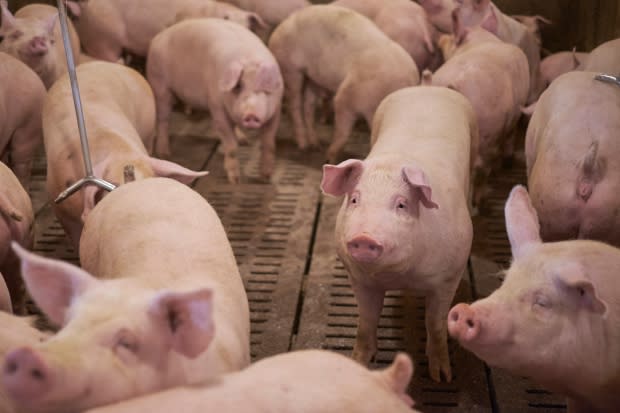China to increase examination of Canadian pork imports

China's customs agency plans to increase inspections of Canadian pork and pork product imports, Ottawa said in a notice to the industry on Tuesday, a move that could seriously damage the country's industry.
The notice from the Ministry of Agriculture, first reported by Reuters, said the embassy in Beijing had been told the Chinese would open all containers of Canadian meat and meat products and in some cases 100 per cent of the contents will be inspected.
Initially beef producers believed they were included in the increased inspections. But the minister's office later said they would be for pork products only.
"We have … recently been made aware of increased inspection on pork products," Minister Marie-Claude Bibeau said in a statement.
"We are working with producers and industry to underscore the importance of heightened quality assurance efforts to ensure there are no trade disruptions due to administrative errors."
China, locked in a major diplomatic and trade dispute with Ottawa over the arrest of Huawei executive Meng Wanzhou, has already blocked imports of Canadian canola seed and temporarily suspended import permits from two pork plants.
Chinese officials cited "recent cases of non-compliance of pork shipments" and also said the move was linked to the risk of African swine fever and anti-smuggling measures, the ministry said in its notice.
Bibeau said the government is asking all industries that export to China to fill out forms correctly to avoid any administrative problems.
Canada has "very high quality" pork, beef and canola, she said in Ottawa on Tuesday.
"We also have a very robust inspection system which, really, our foreign partners can rely on."
China's pork industry has been badly hit by a deadly outbreak of swine fever.
But increased inspections are "of little concern" said Gary Stordy, the director of government and corporate affairs with the Canadian Pork Council.
The council believes China's comments are "directly related to specific instances" of documents not meeting import requirements, Stordy said via email.
"We have always operated with the expectation that all shipments to China are being regularly inspected" he said.
"This is a supporting documentation problem and not a problem related to food safety."
The Canadian Meat Council, which represents major processors, urged members to "increase significantly the surveillance and compliance with all requirements" for exports to China.
"We cannot stress enough that the slightest non-compliance could jeopardize our entire meat exports to China, which would have a disastrous effect on all CMC members," it said in a message to members.

